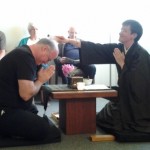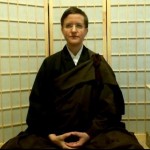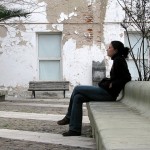 I spent last week at an intensive, silent Zen meditation retreat. We meditated for 7 hours a day and spent the rest of our waking hours in structured, mindful activity. Even though I’m officially a Zen “teacher” and have done well over 40 such retreats, I identified and resolved a significant doubt I was holding on to. This is, of course, humbling and wonderful at the same time.
I spent last week at an intensive, silent Zen meditation retreat. We meditated for 7 hours a day and spent the rest of our waking hours in structured, mindful activity. Even though I’m officially a Zen “teacher” and have done well over 40 such retreats, I identified and resolved a significant doubt I was holding on to. This is, of course, humbling and wonderful at the same time.
I realized that I doubted the existence of God. Or, to put it in Zen terms (as I explained in my post, The Nature of the Zen “God”): the Ineffable, Something Greater, It, a coherent and meaningful structure to the universe, a way in which everything is actually One, etc. From here on out I’ll drop the use of the word God – I only used that word in the title of this post because it’s the term most people will relate to. However, as I confessed in The Burden of Atheism, a theistic image of any kind really doesn’t work for me.
Back to my doubt. What I didn’t doubt was the efficacy of Zen practice. What I didn’t doubt was that when you drop all your concepts, views, and expectations in order to experience life directly, the universe appears as a seamless whole that is precious and luminous just as it is. Okay, now note something about that last sentence: the universe appears as a precious and luminous whole.
I realized that – at some deep level – I doubted whether the universe really was a precious, luminous, seamless whole. I knew it was possible to relate to it that way through practice, which is pretty cool in and of itself. But there’s a big difference between conviction about a transcendent way of relating to reality and conviction about reality being transcendent. It’s the difference between encouraging someone in despair by saying, “If you let go completely and experience things directly, you can see the way in which everything is One,” and saying, “Regardless of whether you see it right now, everything is One.”
This doubt about the transcendent nature of reality was behind the question I asked at my teacher’s memorial service on Nov. 6th, 2014 (Wearing My Heart (and Doubt) On My Sleeve). I don’t know if this doubt makes sense to anyone else, but it makes perfect sense to me and was the closest doubt to my heart. That I’ve found so far, anyway.
So… how did I resolve this doubt? First of all, I should say that I’m not claiming Full Enlightenment. Diligent and honest spiritual practice brings us continually into new territory, and my eye of study and practice is still very limited. Nevertheless, sometimes doubts do get resolved. Forever.
What I realized first was that I was remaining carefully agnostic about the transcendent nature of reality because I can’t grasp it with my mind. I place no stock whatsoever in anything I can’t directly experience for myself – and how can I get outside myself and verify that all being is One? That we are all part of the same body? That compassion is part of the structure of the universe because everything really is connected? That I really am the same as you – literally, not just by default when we drop our ideas of separateness? I am a trained scientist. I’m not going draw conclusions about the nature of the universe that are beyond the scope of my direct experience, and I do not believe we ever shed our humanity in order to float momentarily in a transcendent realm that gives us a supernatural perspective.
And yet. During the meditation retreat one of the teachers gave a talk in which she shared a story about the Buddha. I assume it’s mythologically embellished, because, after all, I am a skeptic. It turns out the Buddha, before his Enlightenment, tried many different kinds of meditation and ascetic practices. None of them gave him the results or insights he wanted. Then he remembered a kind of meditation he had entered spontaneously as a child of about seven, while he was waiting all day for his father. It was natural and easy, and led to a profound calm. The adult Buddha decided to go back to that kind of meditation.
Here’s the clincher: when the child Buddha was seated in meditation, the natural world around him recognized the profound nature of his practice. Throughout the day the sun and shadows moved as they always do, but the shade of the Roseapple tree under which the child was seated did not. The boy was carefully shaded all day.
When I heard this story during the retreat (not for the first time), tears came to my eyes and my heart swelled in my chest. I recognized how much I wanted it to be true that all is One – including the Buddha, me, and the natural world. I wanted the trees to care. I wanted the universe to be One Body such that all parts of it will support something good, just as it will deal with something bad by isolating and fighting it the way our own body’s immune system will.
Then I realized that my heart doesn’t doubt. This so-called “heart” part of me has never doubted the transcendent nature of reality, which I experience most clearly when I look at a songbird. There it is: the loving, transcendent nature of reality shining through life.
When I write about, or think about it, my mind still makes arguments against it. “What do you mean?” it asks. “Where is this transcendent nature, and how can you know it’s benevolent? What about evil and injustice and sadness?” And on and on. The mind can whittle away at Faith like a termite. It tells me I’m succumbing to irrational wishful thinking.
But I can also directly experience reality with my heart, and this mode of experience is every bit as legitimate as understanding with the mind. When I witness acts of spontaneous compassion and generosity, when I see people respond to one another intimately, when I notice how many ways I am taken care of, I recognize It. Directly. Like there’s a God-meter in my chest. Oops – I used “God” again. (It’s pretty easy to do that as a former Catholic.) In Buddhism, we have word for It too – a word I’ve never resonated with until now: Dharmakaya. The Essence-body of Buddha.
We can’t look at Dharmakaya directly. That kind of looking involves the mind, and the Dharmakaya is beyond description or comprehension. However, we can know it because we are manifestations of it, and because it shines through life at certain times, clear as can be. Still, we can’t even look at our knowing directly – we can only experience it.
One last thing: I hope you will take my example and be honest about your doubts – to yourself, and to people you trust and respect. Cherish and hold your doubts even if they are painful, because they are your gateway into a deeper experience of the truth. Don’t let your pride at being a teacher, adult, senior, parent, priest, leader, entrepreneur, professional, etc. get in the way. Everybody doubts.












